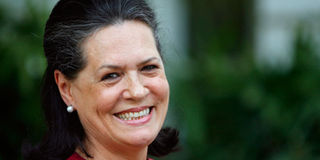India’s Nehru-Gandhi dynasty set for generation change

Ms Sonia Gandhi (L) has been at the helm of the Indian National Congress party since 1998. Her son Rahul Gandhi is set to take over as president of the Congress in April. AFP Photo
What you need to know:
Descending. Rahul Gandhi was appointed the party’s number two leader in Jaipur in 2013, but he has had a disappointing run, leading the party to a series of poll debacles including its worst drubbing in a national election last year
Rahul Gandhi, the fourth generation of the Nehru-Gandhi dynasty, is set to take over as president of the Congress, the 130-year-old party, in April.
Mr Gandhi, 44, will replace his mother Sonia Gandhi, who has been at the helm of the party since 1998.
While Rahul Gandhi’s crowning has been anticipated for some time, the news has crystallised at a time the party is confronting criticism over his sabbatical during the budget session.
Mr Gandhi wanted time to think, Congress leaders said after announcing his break on Monday. They also clarified that he was “not quitting politics.”
Rahul Gandhi was appointed the party’s number two leader in Jaipur in 2013, but he has had a disappointing run, leading the party to a series of poll debacles including its worst drubbing in a national election last year.
A section of the party believes that he must take full control and shed the image of a reluctant politician before restructuring the organisation.
There was speculation that Mr Gandhi took time off as he was frustrated at not being able to bring major changes in the party and replace the “old guard” that has advised his mother.
One theory is that he resented being blamed for electoral disasters including last month’s Delhi result which saw the Congress unable to win even one seat after 15 years in power.
Security concerns
Born on June 19, 1970, Rajiv Gandhi comes from the politically influential Nehru–Gandhi family. Due to security concerns, Gandhi constantly had to shift schools in his youth.
He studied abroad under a pseudonym, his identity being known only to a select few including university officials and security agencies.
After obtaining degrees in international relations and development studies at the universities of Rollins and Cambridge, Gandhi worked at the Monitor Group, a management consulting firm in London, before establishing the Mumbai-based technology outsourcing firm, Backops Services Private Ltd.
In 2004, Gandhi re-entered public life when he ran for and won his father’s old Lok Sabha (lower house of Indian Parliament) seat of Amethi, Uttar Pradesh. At the time, this move generated surprise among political commentators, who had regarded his sister Priyanka as being the more charismatic and likely to succeed.
It generated speculation that the presence of a young member of India’s most famous political family would reinvigorate the Congress party’s political fortunes among India’s youthful population.
A few years later, in 2007, Gandhi was elected as the general secretary of the Congress party, an executive post also held in the past by his father, and by his great-grandfather, Jawaharlal Nehru. Amidst calls from Congress party veterans for his greater involvement in party politics and national government, Gandhi was elected Congress vice-president in 2013.
Gandhi led the Congress campaign in the 2014 Indian general election in which the party suffered its worst electoral result in its history, winning only 44 seats compared to 206 seats won previously in the 2009 general election.
His ascendency to the top seat of the party in April will therefore mark an complete generation shift.
Rahul Gandhi
In the Congress Party, Rahul Gandhi’s pedigree stretches back even further than it does in government. His mother, father, grandmother, great-grandfather, and great-great-grandfather have all headed the 130-year-old party that spearheaded India’s fight for independence from the British.
Motilal Nehru, the family patriarch — a kind of Indian Joseph P. Kennedy Sr. — was a wealthy lawyer who first became Congress president in 1919. Sonia Gandhi, Rahul’s mother, has served as party president continuously since 1998, longer than anyone else in its history.
Indeed, apart from a brief interregnum after Tamil militants assassinated Rajiv Gandhi in 1991, the party has been a family chiefdom ever since India took power in the 1960s. Accepting this lineage as gospel is virtually the first rule of belonging to the party.
Until a few years ago, it appeared all but certain that the younger Gandhi would follow the same gilded path to power as his father, as the anointed heir of India’s natural ruling party.
Educated at Harvard; Rollins College, a small liberal arts school in Florida; and at Cambridge University, Gandhi spent the better part of his 20s in the West, including a stint as a management consultant under an assumed name at business guru Michael Porter’s Monitor Group in London.




